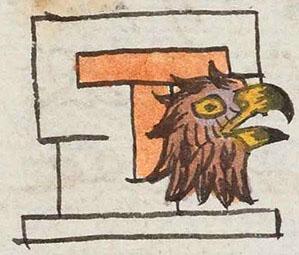Cuauhtinchan (Mdz42r)
This compound glyph for the place name Cuauhtinchan (or Cuauhtin Inchan) includes two principal elements. One is a building that is normally read "house" (calli), but in this case it is a "home" (chantli). Superimposed over the entrance to the building is the head of an eagle (cuauhtli). The building is a standard white with terracotta-colored, t-shaped beams at the entrance. The eagle has brown feathers, dark fading to light going toward the face. The beak and eye are a golden yellow.
Stephanie Wood
Berdan and Anawalt note how rarely chantli appears in place names in the Codex Mendoza. The stem -chan has a third-person plural possessive "in" before it (giving possession to the eagles), thus the house is actually the home (chantli) of eagles. Gordon Whittaker {Deciphering Aztec Hieroglyphs, 2021, 87) proposes that "chan" is meant when the compounding element is superimposed over the building, as we see in this compound glyph. Berdan and Anawalt have also considered the positioning of the eagle's head as being influential in the reading.
Whittaker further notes the syncopation of (cua)cuauhtin (eagles, in the plural) with the plural-possession form of home, inchan, forming Cuauhtinchan, where one of the "in" syllables drops away. Because Karttunen also sees "cuauhtin" (eagles, plural) coalesced with the "inchan" in the place name, and so it is a "two-word place name." Separating the reading into two words can make it into a sentence, "It is the home of the eagles," where the verb "to be" is so often implied in early Nahuatl.
Stephanie Wood
quauahtinchan. puo
Cuauhtinchan, pueblo
Stephanie Wood
c. 1541, but by 1553 at the latest
Stephanie Wood
eagles, houses, buildings, águilas, casas, edificios, hogares, posesivos, Quauhtinchan, feathers, plumas, nombres de lugares

cuauh(tli), eagle, https://nahuatl.wired-humanities.org/content/cuauhtli
in-, their (possessive prefix), https://nahuatl.wired-humanities.org/node/176143
chan(tli), home, https://nahuatl.wired-humanities.org/content/chantli
"Home of the Eagles" [Frances Karttunen, unpublished manuscript, used here with her permission.]
"Home of the Eagles" (Whittaker, 2021, 87); "Home of the Eagles" (Berdan and Anawalt, 1992, vol. 1, 202)
CUAUHTIN•CHAN
Cuāuhtinchān, "En la casa de las águilas"
Miguel León-Portilla, "Los nombres de lugar en náhuatl," Estudios de Cultura Náhuatl 15 (1982), 40.
Codex Mendoza, folio 42 recto, https://digital.bodleian.ox.ac.uk/objects/2fea788e-2aa2-4f08-b6d9-648c00..., image 94 of 188.
The Bodleian Libraries, University of Oxford, hold the original manuscript, the MS. Arch. Selden. A. 1. This image is published here under the UK Creative Commons, “Attribution-NonCommercial-ShareAlike 3.0 License” (CC-BY-NC-SA 3.0).





